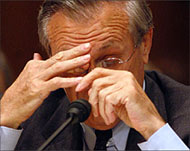Bush stands by his man over scandal
President George Bush has brushed off calls for Secretary of Defence Donald Rumsfeld’s resignation.

At a press conference on Monday, Bush turned to the beleagured secretary and told him: “You are doing a superb job.”
But lawmakers are set to unearth anyone responsible for torturing Iraqi prisoners and planned fresh hearings, which could further weaken Rumsfeld.
The Senate was scheduled to hold sessions early on Monday devoted to a resolution condemning US troops’ excesses against Iraqis at Abu Ghraib prison. The House approved a similar resolution at the weekend.
Several influential Republican senators, from moderate John McCain to conservative Lindsey Graham, joined Democrats in blaming a break in the chain of command.
They also sought to throw as much light as possible on the scandal that has grown more embarrassing for the Republican president, six months away from a 2 November vote, in which Bush is up for re-election.
 |
|
There is growing pressure for |
Both Republicans and Democrats appear ready to blame the Pentagon chain of command for the scandal.
Rumsfeld withstood withering questioning for six hours on Friday, where he warned members of Congress there were possibly hundreds of photos, as well as videos of abuse that if released, could worsen a situation that already has been highly damaging to US credibility.
Picture dilemma
Also on Monday, Pentagon officials told reporters the White House is considering whether or not to make public graphic videos and photographs of torture of Iraqi prisoners.
They said no decision had been made whether further images would be released.
“We haven’t ruled it (release) in or out,” Defence Department spokesman Lawrence Di Rita said. Photographs of the abuse of Iraqi prisoners by the US military were first broadcast by CBS, but additional photographs and videos have not been made public by the Defence Department.
A Defence Department official, who asked not to be identified, said President George Bush had been shown photographs of the abuse during a visit to the Pentagon on Monday.
The pictures are part of a record being used in several US investigations of the issue, which has caused deep anger in the Arab world.
Bush shown images
The large, colour prints were selected from hundreds of photographs of abuse taken at Abu Ghraib prison in Iraq. They were shown to Bush at an hour-long briefing at the Pentagon, attended by top cabinet officials and US Defence Secretary Donald Rumsfeld, the official said.
|
“Physical and psychological coercion were used by military intelligence in a systematic way to gain confessions and extract information.” ICRC report |
Di Rita, who has seen the images, said they were “broadly consistent with what we’ve already seen.”
“They were disturbing. There are some involving humiliation of a nature we’ve already seen,” he said.
“There is clearly inappropriate behaviour, including some inappropriate behaviour of a sexual nature,” he said.
He added that discussions were still underway with members of Congress on whether to make a public release of the images, and if so how.
ICRC report leaked
But details of the abuse were made known to US-led forces in February by the International Committee of the Red Cross (ICRC).
The ICRC report was confidential. But a copy leaked on Monday said ICRC staff had seen Iraqi prisoners being kept “completely naked … and in total darkness” by US and British
forces.
The Geneva-based humanitarian organisation documented “frequent” abuse, including beatings, threats, tight handcuffing, prolonged exposure to the baking sun and the deprivation of sleep, food and water.
Military intelligence officers told the Red Cross the abuse was “part of the process”.
“Physical and psychological coercion were used by military intelligence in a systematic way to gain confessions and extract information,” it said.
Although the Red Cross made repeated warnings to the US-led coalition about the abuse throughout 2003, this appeared to have had little effect on the occupation forces, the report said.